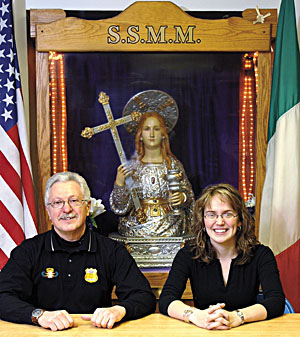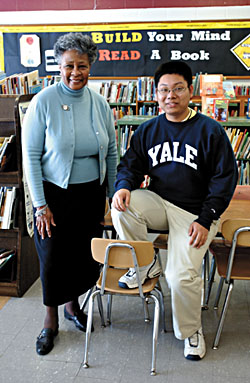 | "It brings all the fond memories back that you had in your youth, the innocent days when there were no problems and everyone was healthy and everything was good in life ... cooking on a Sunday morning, the smell of the sauce ...," muses former police lieutenant Harry DeBenedet (left), recalling the time when New Haven boasted two predominantly Italian neighborhoods. |
When Yale police lieutenant Harry DeBenedet talks about the predominately Italian neighborhood in New Haven where he grew up, you can almost smell calzones baking in the oven.
Like many older residents of the Elm City, DeBenedet can vividly recall a bygone era of closely knit communities and ethnic enclaves that have dispersed or vanished. Now, thanks to the New Haven Oral History Project (NHOHP), funded by Yale and a grant from the Community Foundation for Greater New Haven, such memories are being recorded and preserved for future generations.
DeBenedet is among two dozen New Haven residents whose living testimonies of the city have already been recorded in interviews with Yale student volunteers, and many more interviews are being conducted and gathered for eventual storage in the Yale Library.
Led by New Haven native and recent Yale graduate Andrew Horowitz, the project was launched last semester as an initiative of the Department of History. Horowitz and history professor Glenda Gilmore wanted to provide a way for Yale students to interact with city residents and to preserve New Haven's history for researchers across the nation. The NHOHP will pursue a variety of projects -- from documenting New Haven's connection with the harbor to exploring its history in the arts -- over the next few years.
The NHOHP launched its first round of interviews while Horowitz was teaching a section of the popular Yale course "New Haven and the Problem of Change in the American City." The course, which offers a multidisciplinary approach to understanding New Haven as a prototype of post-industrial urbanism, draws extensively on Professor Douglas Rae's critically acclaimed study of the evolution of American cities, "City: Urbanism and Its End."
Horowitz, a former student of Gilmore, had served two summer internships in the city administration and had also spent a semester working at the renowned Southern Oral History Program at the University of North Carolina. He put his experience to good use by training students to conduct and record interviews germane to their chosen research topic. So, armed with minidisk recorders, participants in the section went forth to get testimony from those who know New Haven best of all: its residents.
Yale junior Kirby Smith chose as the subject of her research paper the Italian societies that flourished particularly in the early part of the 20th century. The social clubs were places where people of a common ethnic heritage could meet, plan and celebrate events such as street fairs and banquets, sometimes to raise funds for local charities, but always to revel in their shared culture.
Following a wave of Italian immigration to New Haven in the late 19th century, there were around 80 such societies with more than 10,000 members, explains Smith, adding that she was surprised to learn that almost a dozen of those social clubs still exist, and that DeBenedet is an active member of five of them. Although her interview focused on social clubs, DeBenedet's uninterrupted narrative brought to life many other aspects of New Haven in the mid-20th century, recalls Smith.
Intending only to use the interviews with DeBenedet to provide "color" to her paper, Smith ended up building her paper around the interviews.
"Talking to one person ties together disparate subjects we covered in class," Smith says. DeBenedet also provided a human dimension to Smith's study. "You can't find out what these meant to people," she says of the events she had only read about.
Similarly, sophomore Tamar Rubin, whose paper examined Hillhouse High School during the Great Depression, found that interviewing Sydney Bruskin, a graduate from the school's class of 1932, vivified the experience more than anything she could find in the written archives. She says she knew from studying the period that the Depression signaled a great change in American secondary schools: More students attended high school owing partially to the lack of employment opportunities, and high schools drew students from a much wider geographical range than the immediate neighborhood.
"Books talk about how high schools were getting more crowded, but talking to Sydney Bruskin allowed me to picture the buses lined up in front of the high school, carrying students from the suburbs, and the crowds of kids walking to school from all areas of New Haven," Rubin says.
"Oral histories enable the historian to portray social history in its rich detail," says Gilmore, who is the Peter V. and C. Vann Woodward Professor of History and chair of the board of the NHOHP. Making the past more vivid, though, is only one advantage of oral history programs, she contends.
First and foremost, Gilmore says, oral history is a pedagogical tool. Yale student interviewers go out "as learners, not academics," she emphasizes. Students learn not just from the material they gather and the people they speak to, but from the method itself, she explains, because recording personal testimonies teaches, among other things, the value of individual accounts as a way of understanding the full scope of history.
"Oral history tends to gather records of people who don't otherwise get into the archives," Gilmore says. Local leaders and major players of important events make it to the newspapers and official records, she notes, but many of the people whose lives are most affected by those events are ignored by history.
Gilmore puts it even more bluntly, noting that oral testimony "cuts past the mayor to people who lived their lives in the midst of tremendous change."
Indeed, the NHOHP has made a study of Urban Renewal in New Haven its first major research project. When the Manuscripts and Archives section of the Yale Library recently became the repository for the records of the New Haven Redevelopment Agency, Horowitz got the idea to use the NHOHP to complement this new addition to the Yale archives.
With major financial support from the Yale administration, Horowitz began looking for student volunteers to collect memories of New Haven residents whose lives were directly affected by the federally funded Urban Renewal program, which sought to make New Haven into the first "slumless" city, and relocated some 25,000 New Haveners.
One of the casualties of the redevelopment program was the disruption, and in at least one case, the elimination of city neighborhoods. For instance, DeBenedet's Oak Street neighborhood was razed to make way for Route 34. DeBenedet's membership in the Oak Street Alumni group, one of his social clubs that regularly brings old friends of the defunct neighborhood together, turned out to be a treasure trove of retirees with vibrant memories, says Horowitz.
Finding Yale students who would be willing to go into the community to gather the stories of an aging population was no problem at all, says Horowitz. Within days of sending out a call for volunteers by e-mail, he got more than a dozen responses, including several from students he had taught in the city course.
Finding people to interview was equally easy. The volunteer historians discovered not just willing subjects but a level of enthusiasm for the project that they hadn't anticipated, notes Horowitz, adding that what began as a scholarly pursuit to record personal testimonies for future generations became a forum for many New Haven senior citizens to relive old times for their own sake, as well as for posterity.
Also, by opening dialogues between Yale students and New Haven residents, the project has really become "a way for Yale students to appreciate their community," Horowitz contends.
The grant from the Community Foundation enables the NHOHP to bring its work into the community and "give back" the history that volunteers have documented. The NHOHP will offer a series of "Local History Days" at the New Haven Free Public Library in April, which will offer a chance for city residents to engage in discussions about how their neighborhoods have changed over time.
Under Horowitz's direction, the NHOHP also is embracing a new generation, with a recently initiated pilot program in a third-grade class at New Haven's Dwight School. Getting children to tape their own reflections of actual events is as much a civics lesson on democracy as it is a contribution to the historical record, notes Horowitz. If the written legacy of historical events tends to leave out ordinary people, capturing their words on tape gives children a sense of their importance as witnesses to history and as part of it, he adds.
The possibilities for the future of the New Haven Oral History Project are limitless, Horowitz says, since there is no end of stories or people to tell them.
In the meantime, the future of the first phase of the project has been decided. The interview recordings will be housed in Manuscripts and Archives at Sterling Memorial Library. Transcriptions of the recordings will also be stored at the library and made available through the NHOHP website: www.newhavenoralhistoryproject.org.
In June, the NHOHP will present an oral history-based museum exhibit about Urban Renewal at the New Haven Colony Historical Society, allowing visitors to hear the history of the city through the voices of those who have lived it.
-- By Dorie Baker
T H I S
Project capturing residents'
memories of life in Elm City

Joe Chen (right) interviewed Marion Murray (left) to learn more about parent-teacher associations at two New Haven public schools. Murray has many years of experience as the liaison for the Parent Teacher's Organization for the Dwight School and has helped to spearhead such programs as community dinners, cultural events, talent shows and adult education classes, including English as a Second Language for Spanish speakers.
Pointing as example to Mayor Richard Lee's Urban Renewal program that changed the face of New Haven in the 1960s, Horowitz says, "No one has asked people what it was like to live in what was known as 'the Model City.'"
 W E E K ' S
W E E K ' S S T O R I E S
S T O R I E S![]()
 Peter Salovey appointed as next dean of Yale College . . .
Peter Salovey appointed as next dean of Yale College . . .![]()
![]()
 New office to promote the University's international initiatives
New office to promote the University's international initiatives
![]()
![]()
 Study shows drop in effectiveness of chicken pox vaccine
Study shows drop in effectiveness of chicken pox vaccine
![]()
![]()
 Yale-led coalition helps bring Delta Air Lines to Tweed
Yale-led coalition helps bring Delta Air Lines to Tweed
![]()
![]()
 Squash team's latest victory is 'the ultimate payoff'
Squash team's latest victory is 'the ultimate payoff'
![]()
![]()
 Medical student shares her tales in award-winning column
Medical student shares her tales in award-winning column
![]()
![]()
 Law student to work on criminal justice project as Soros Fellow
Law student to work on criminal justice project as Soros Fellow
![]()
![]()
 Epidemiologist Casals-Ariet dies; discovered relationships of viruses
Epidemiologist Casals-Ariet dies; discovered relationships of viruses
![]()
![]()
 Yale Rep announces event change
Yale Rep announces event change![]()
![]()
 Harshav receives Koret Jewish Book Award
Harshav receives Koret Jewish Book Award
![]()
![]()
 Yale Books in Brief
Yale Books in Brief
![]()
![]()
 Campus Notes
Campus Notes
![]()
Bulletin Home |
| Visiting on Campus
Visiting on Campus |
| Calendar of Events
Calendar of Events |
| In the News
In the News![]()
Bulletin Board |
| Classified Ads
Classified Ads |
| Search Archives
Search Archives |
| Deadlines
Deadlines![]()
Bulletin Staff |
| Public Affairs
Public Affairs |
| News Releases
News Releases |
| E-Mail Us
E-Mail Us |
| Yale Home
Yale Home